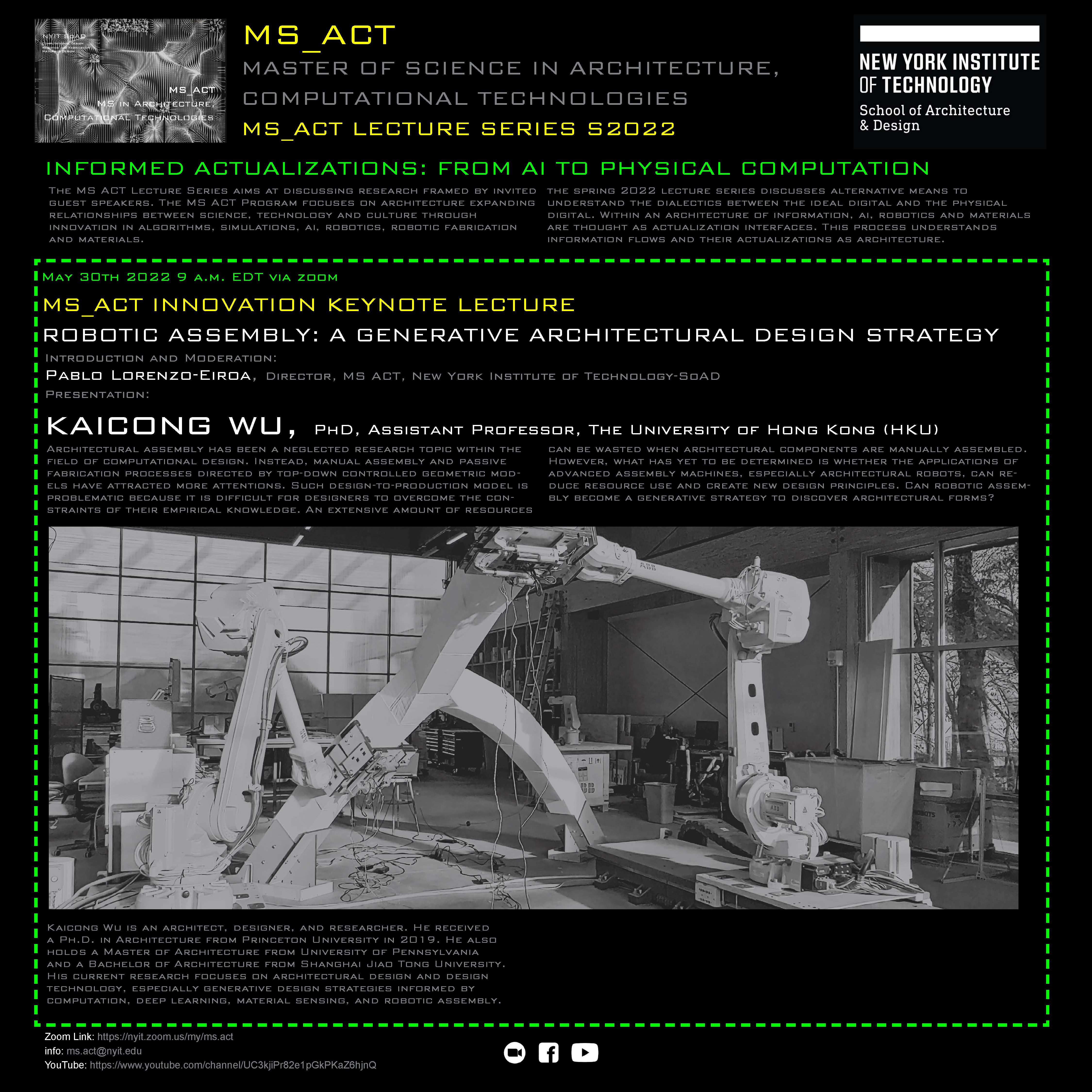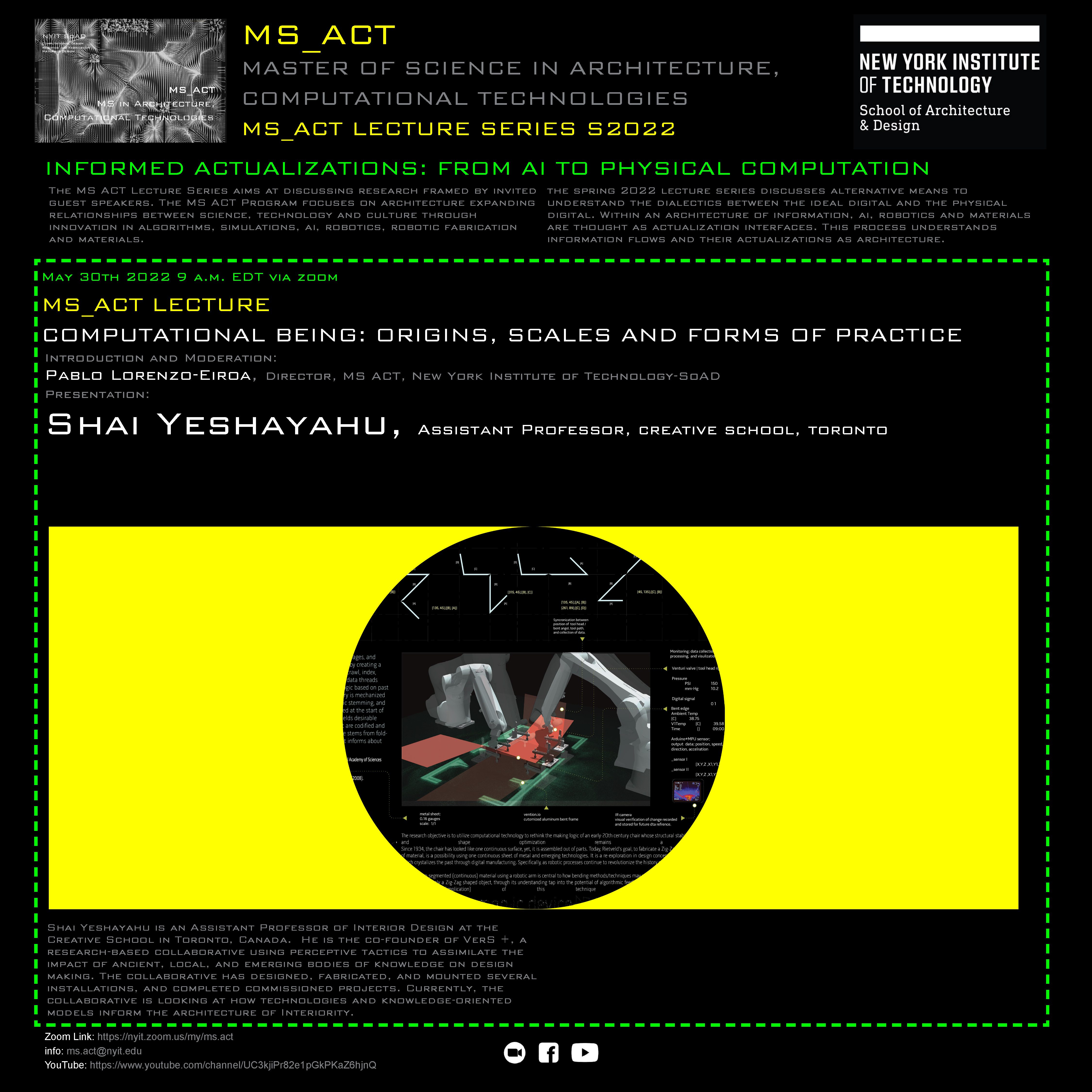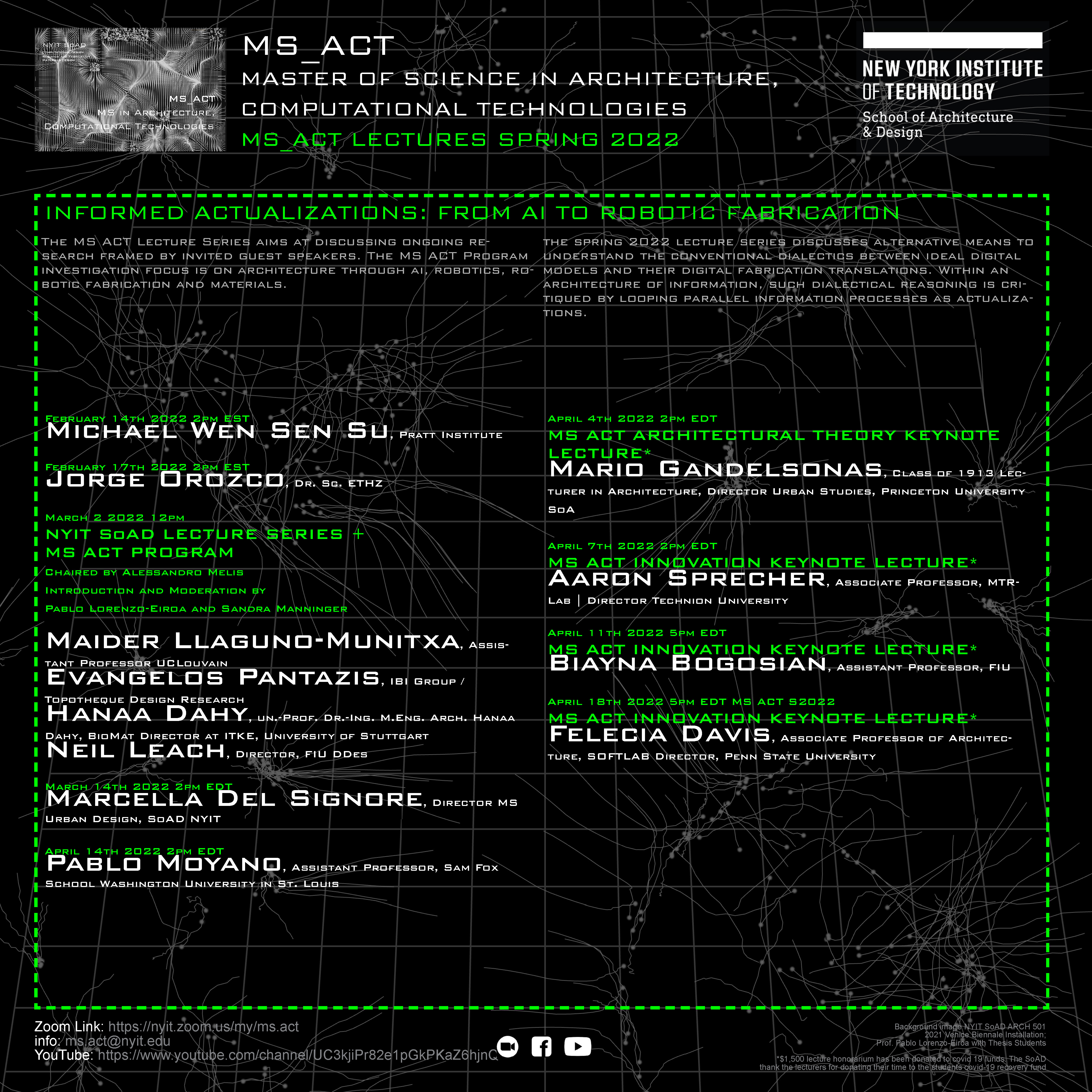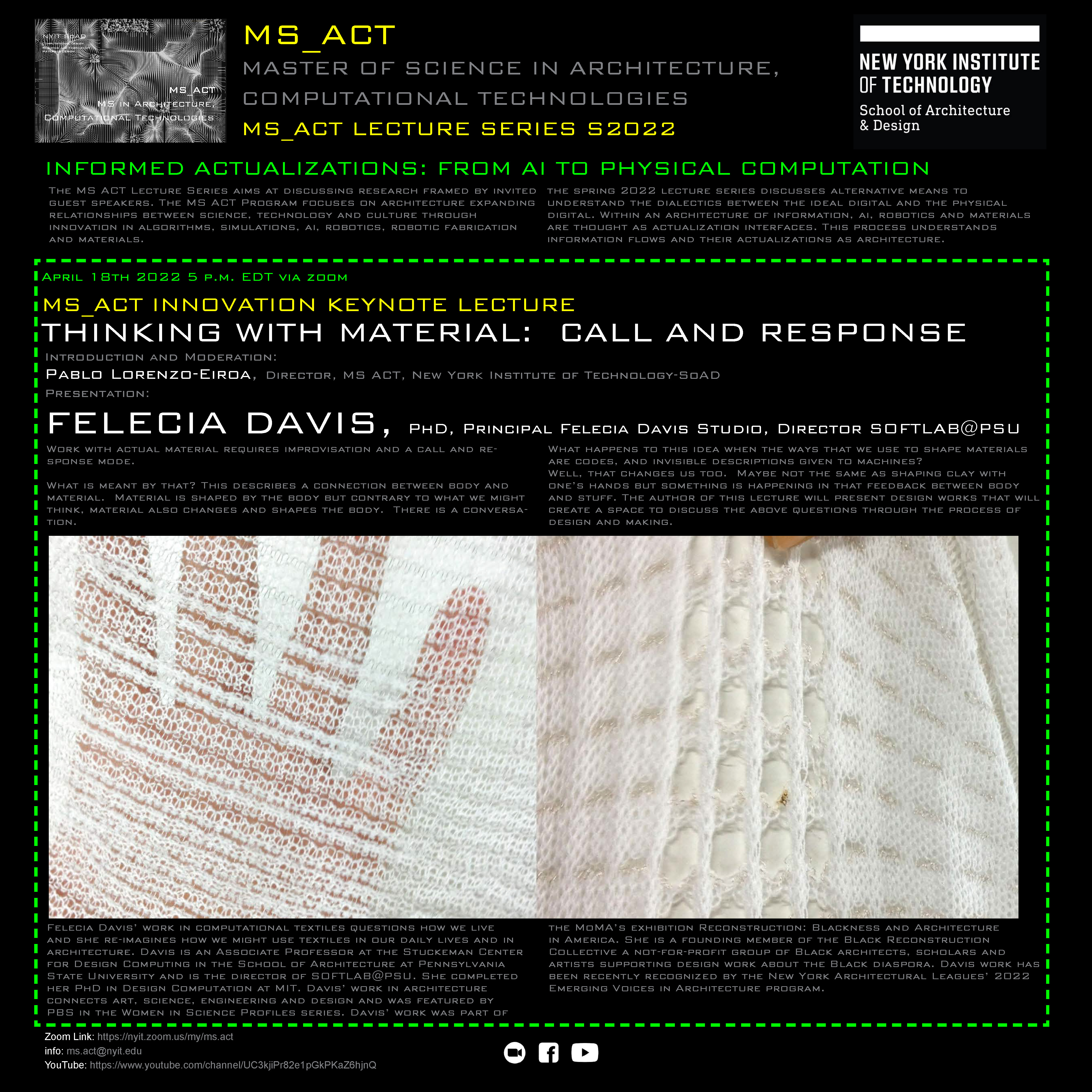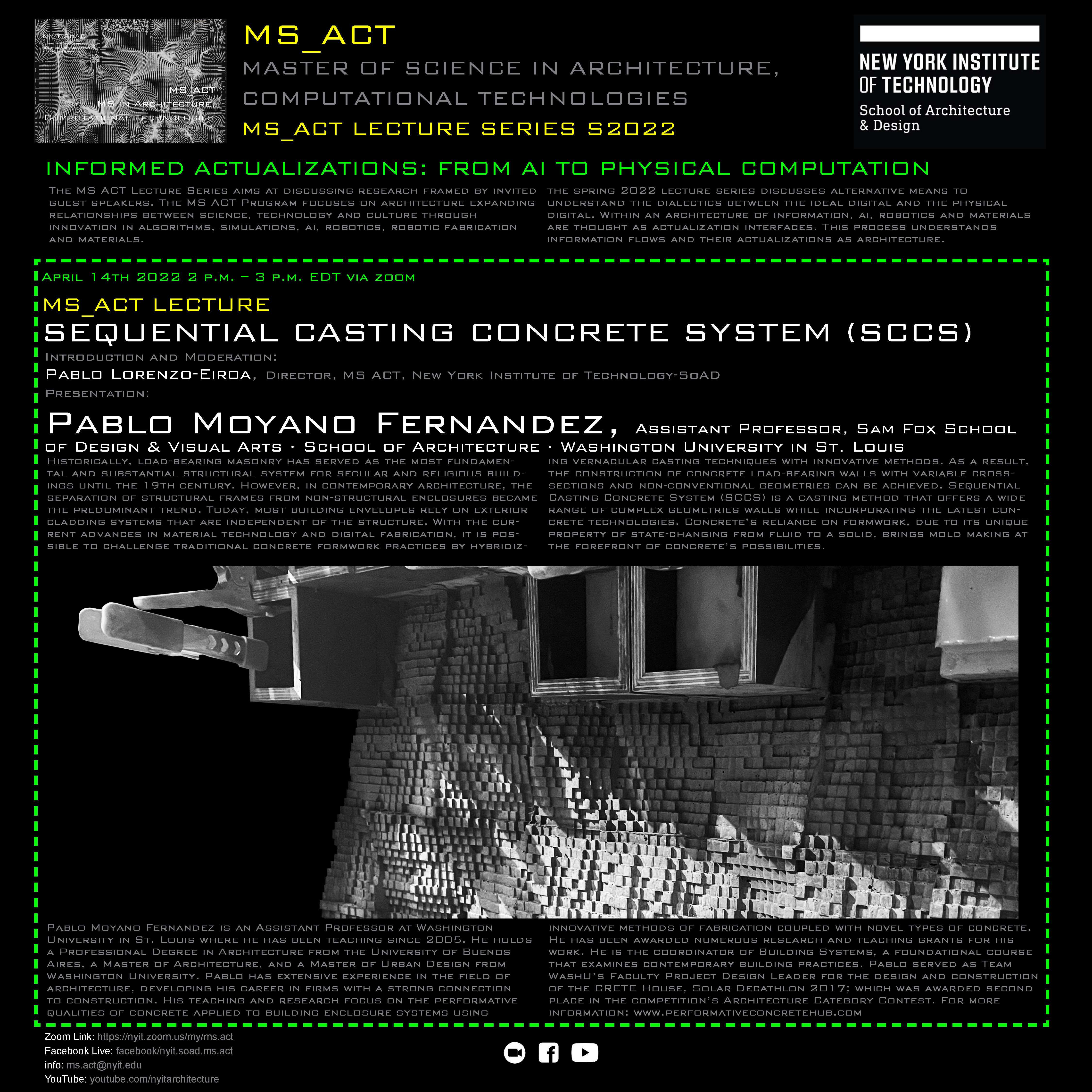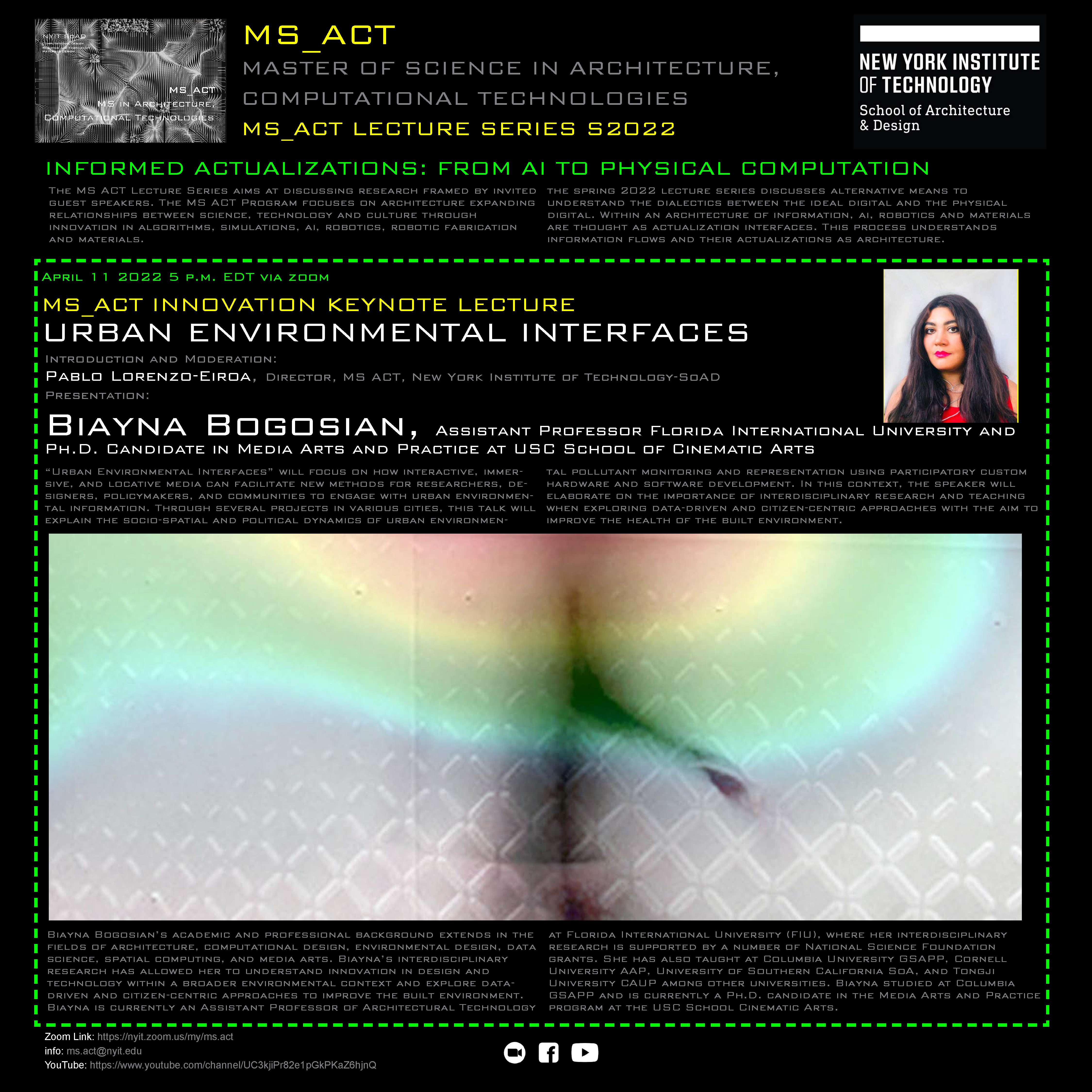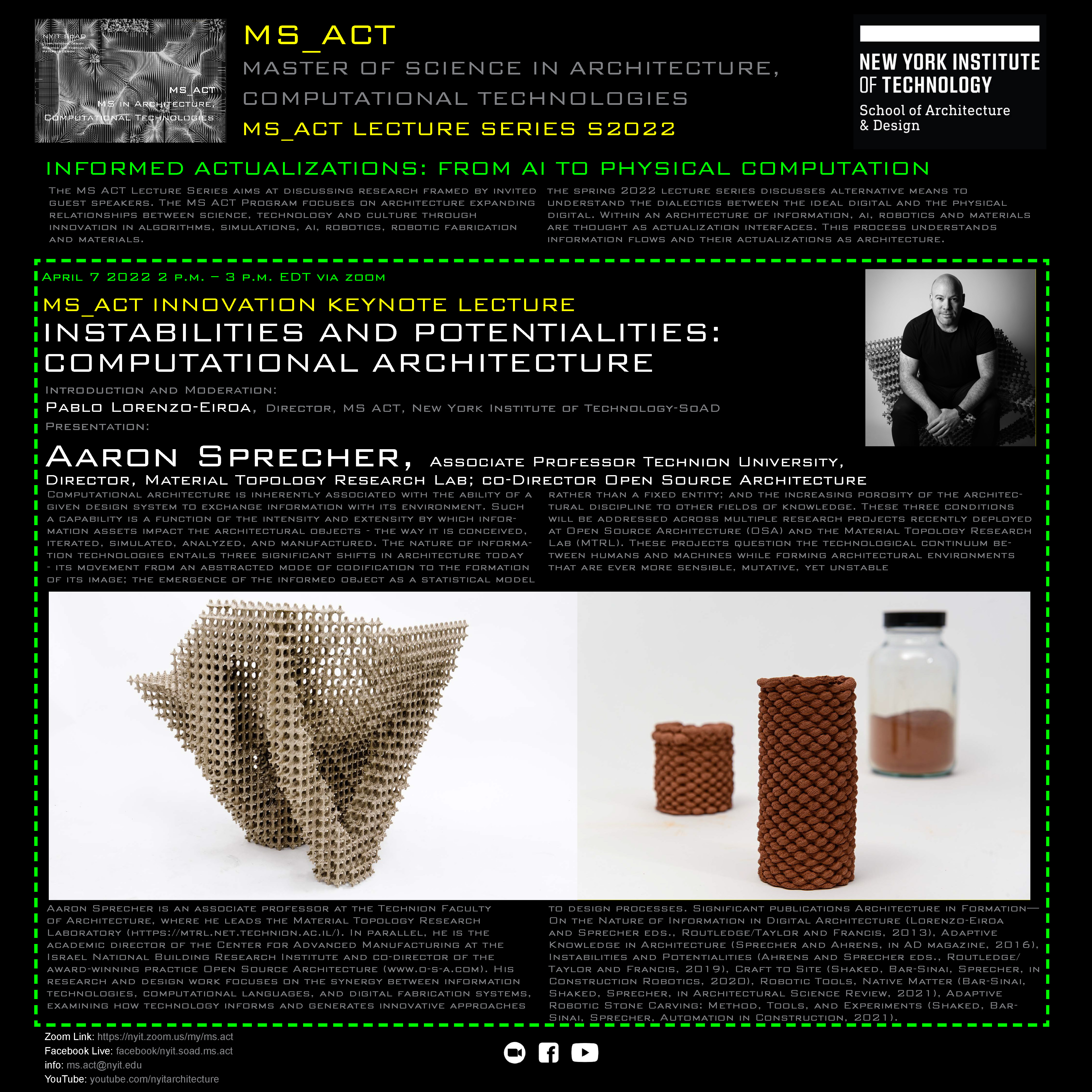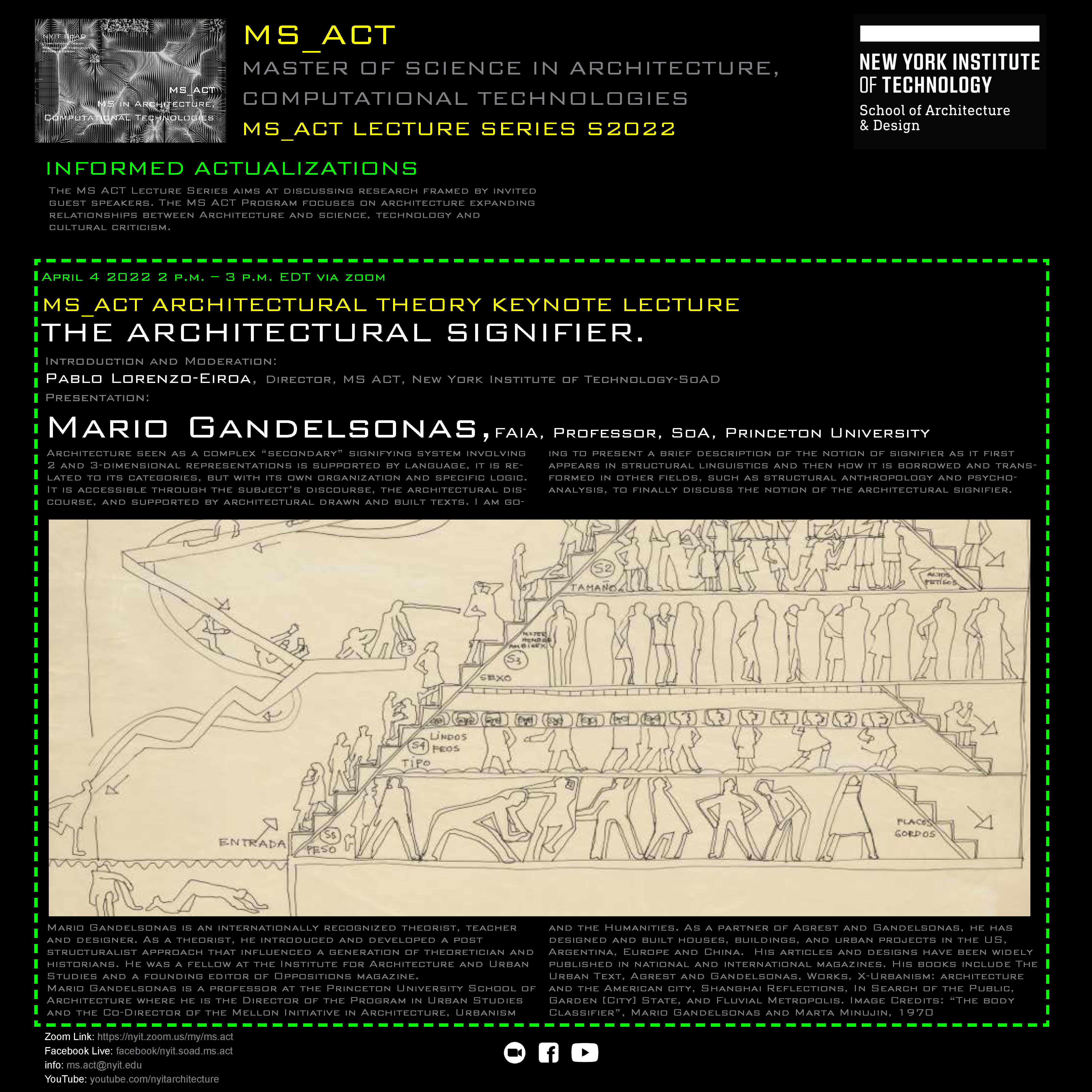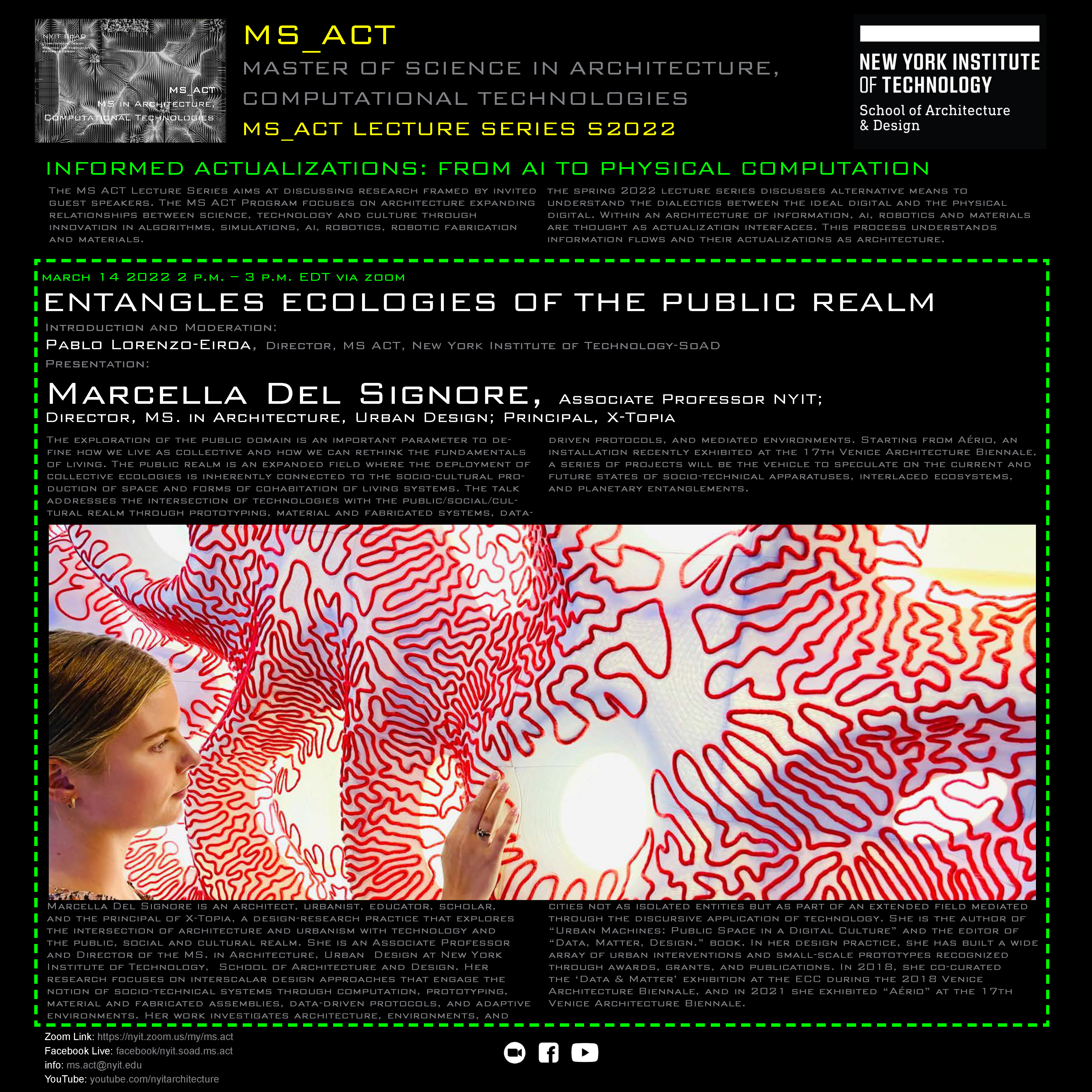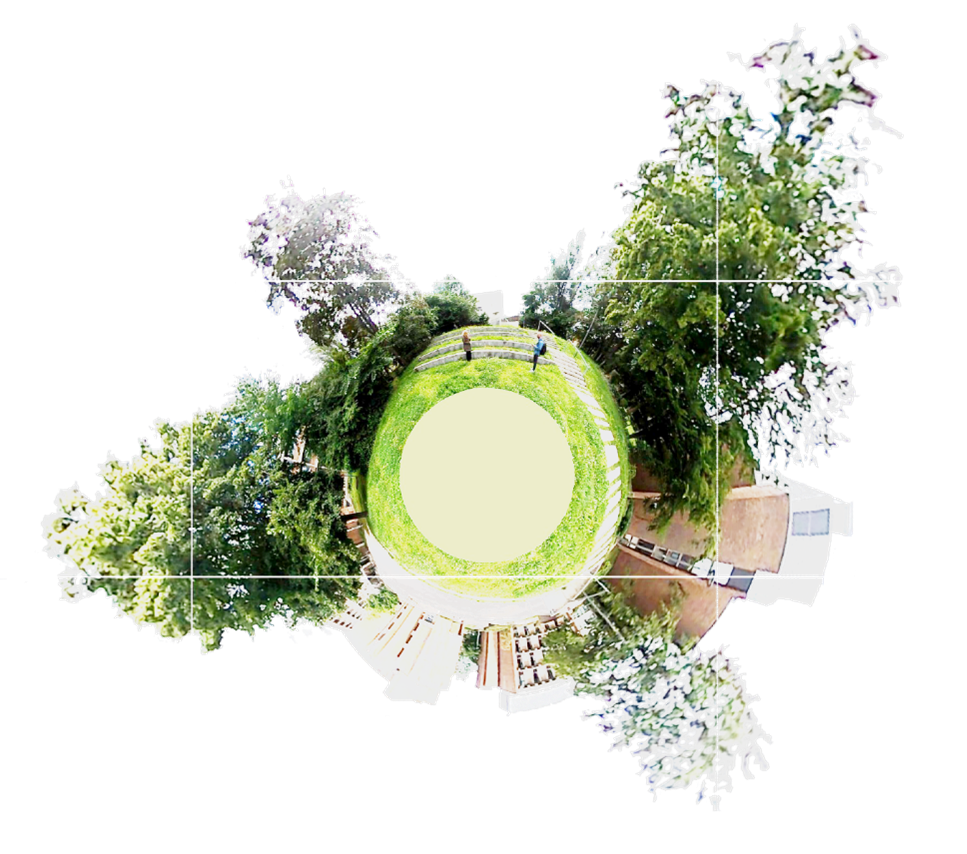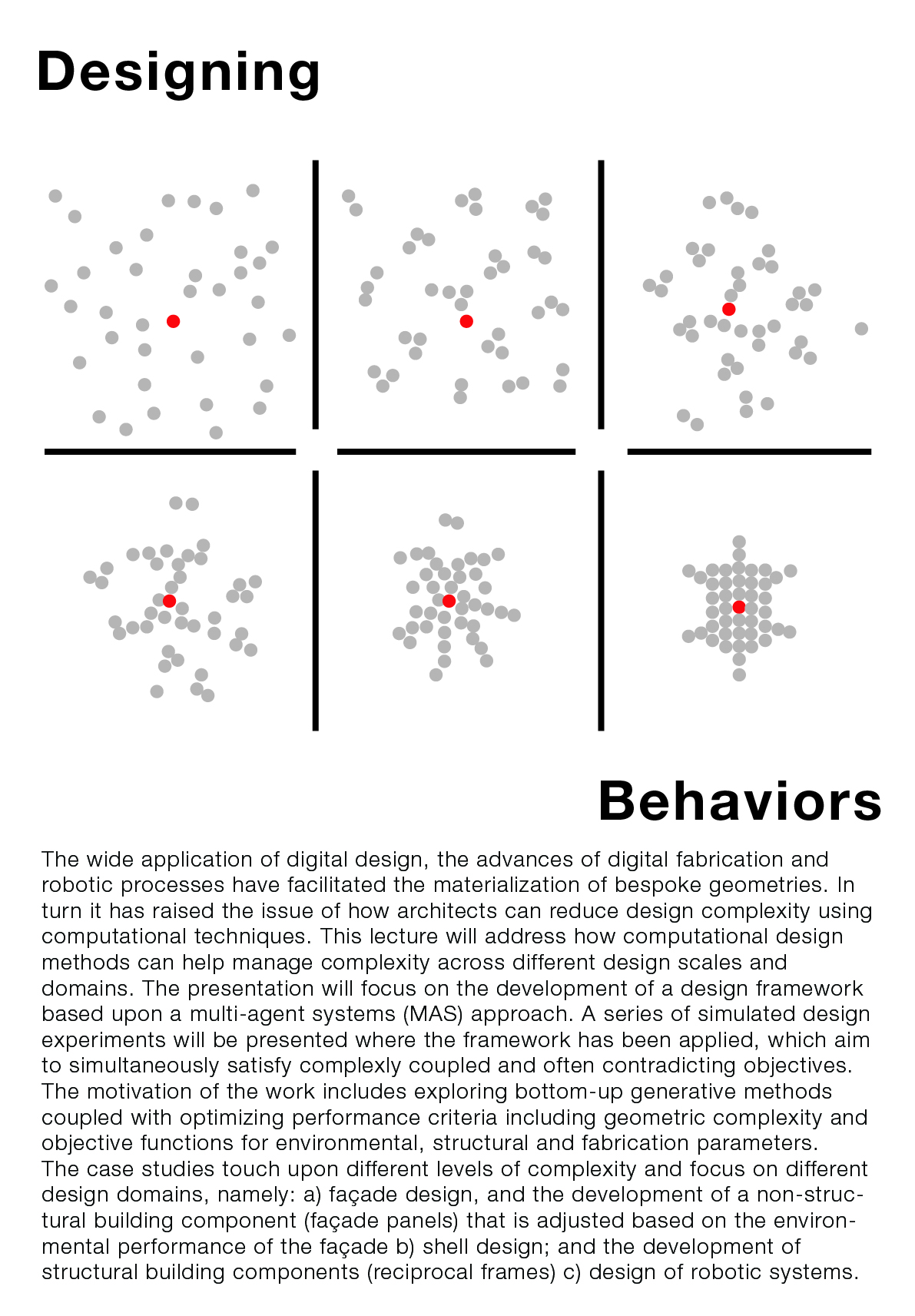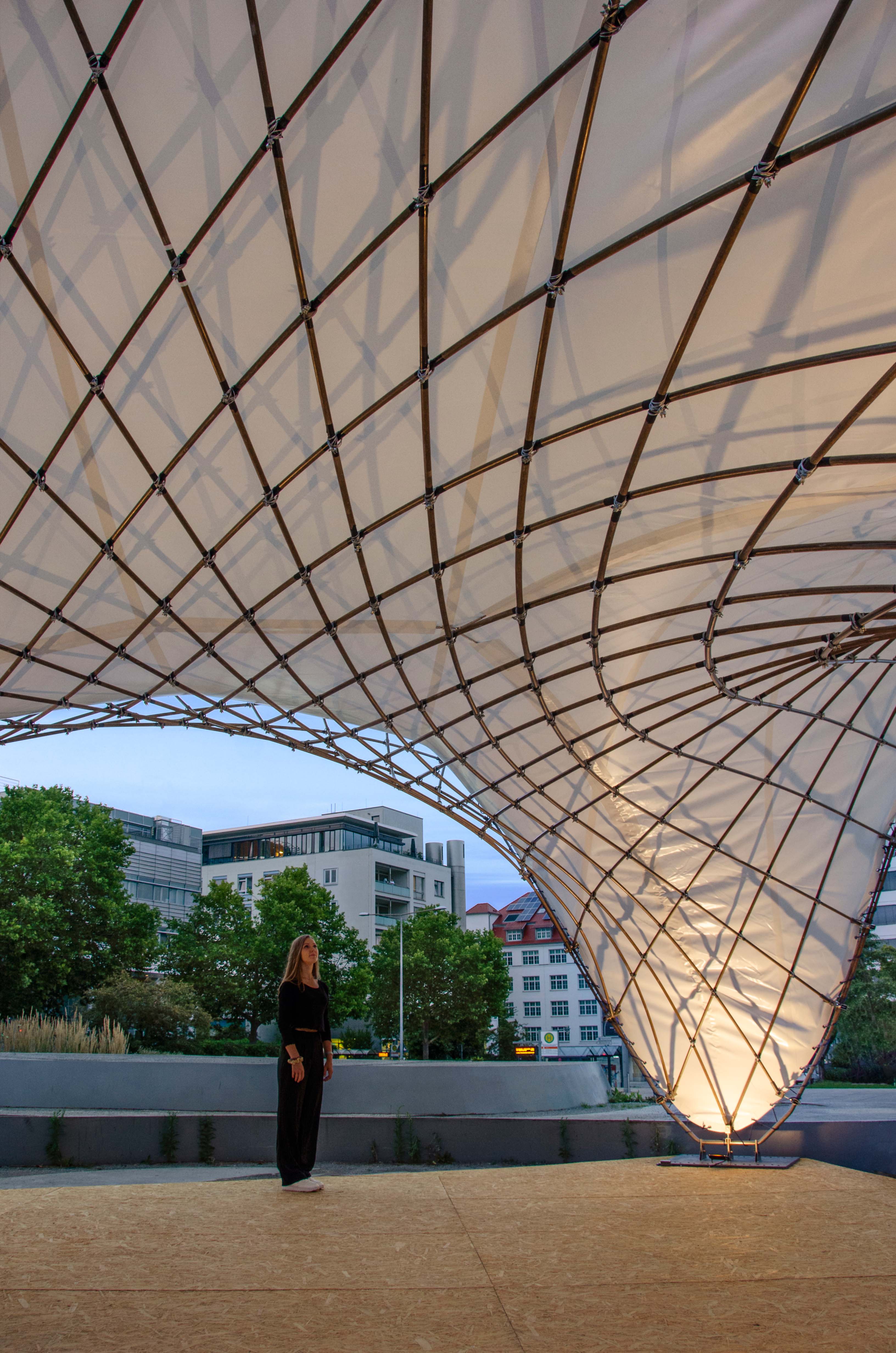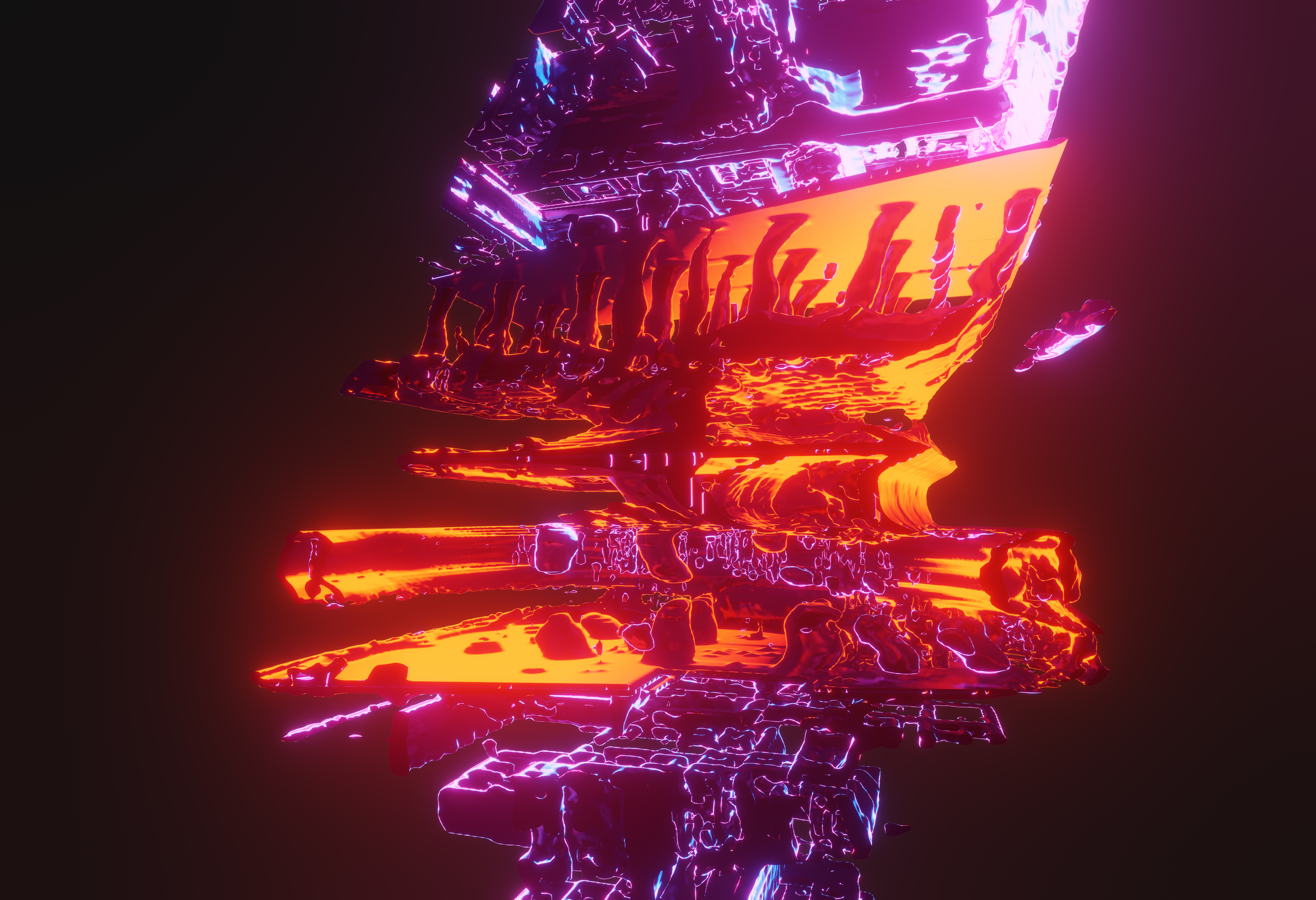Architecture Computational Technologies
Explore design research at the frontiers of architecture through experimentation in computational design, robotic systems applied to fabrication and interactivity, and materiality. For more information please contact ms.act@nyit.edu
Results for "lectures" on Architecture Computational Technologies
MS_ACT INNOVATION KEYNOTE LECTURE Kaicong Wu
MS_ACT INNOVATION KEYNOTE LECTURE
Kaicong Wu,Assistant Professor, The University of Hong Kong (HKU)
Robotic Assembly: A Generative Architectural Design Strategy
Architectural assembly has been a neglected research topic within the field of computational design. Instead, manual assembly and passive fabrication processes directed by top-down controlled geometric models have attracted more attentions. Such design-to-production model is problematic because it is difficult for designers to overcome the constraints of their empirical knowledge. An extensive amount of resources can be wasted when architectural components are manually assembled. However, what has yet to be determined is whether the applications of advanced assembly machines, especially architectural robots, can reduce resource use and create new design principles. Can robotic assembly become a generative strategy to discover architectural forms?
Read More
MS ACT Lecture Shai Yeshayahu
MS ACT Lecture
Shai Yeshayahu, Assistant Professor, Creative School, Toronto
The MS ACT Lecture Series aims at discussing research framed by invited guest speakers. The MS ACT Program focuses on architecture expanding relationships between science, technology and culture through innovation in algorithms, simulations, ai, robotics, robotic fabrication and materials. The spring 2022 lecture series discusses alternative means to understand the dialectics between the ideal digital and the physical digital. Within an architecture of information, ai, robotics and materials are thought as actualization interfaces. This process understands information flows and their actualizations as architecture.
Read More
MS ACT Lecture Series Spring 2022
Informed actualizations: From AI to Physical Computation
The MS ACT Lecture Series aims at discussing research framed by invited guest speakers. The MS ACT Program focuses on architecture expanding relationships between science, technology and culture through innovation in algorithms, simulations, AI, robotics, robotic fabrication and materials. The spring 2022 lecture series discusses alternative means to understand the dialectics between the ideal digital and the physical digital. Within an architecture of information, ai, robotics and materials are thought as actualization interfaces. This process understands information flows and their actualizations as architecture.
Read More
THINKING WITH MATERIAL: CALL AND RESPONSE MS ACT Keynote Lecture FELECIA DAVIS
MS_ACT INNOVATION KEYNOTE LECTURE. April 18th 2022 2pm EDT. THINKING WITH MATERIAL: CALL AND RESPONSE. FELECIA DAVIS, PhD, Principal Felecia Davis Studio, Director SOFTLAB@PSU. Work with actual material requires improvisation and a call and response mode. What is meant by that? This describes a connection between body and material. Material is shaped by the body but contrary to what we might think, material also changes and shapes the body. There is a conversation.What happens to this idea when the ways that we use to shape materials are codes, and invisible descriptions given to machines? Well, that changes us too. Maybe not the same as shaping clay with one’s hands but something is happening in that feedback between body and stuff. The author of this lecture will present design works that will create a space to discuss the above questions through the process of design and making.
Read More
S2022 MS ACT Lecture: Sequential Casting Concrete System (SCCS) Pablo Moyano Fernandez
MS ACT Lecture S2022
Pablo Moyano Fernandez, Assistant Professor in Architecture, Sam Fox School of Design & Visual Arts ∙ School of Architecture ∙ Washington University in St. Louis
Sequential Casting Concrete System (SCCS)
Historically, load-bearing masonry has served as the most fundamental and substantial structural system for secular and religious buildings until the 19th century. However, in contemporary architecture, the separation of structural frames from non-structural enclosures became the predominant trend. Today, most building envelopes rely on exterior cladding systems that are independent of the structure. With the current advances in material technology and digital fabrication, it is possible to challenge traditional concrete formwork practices by hybridizing vernacular casting techniques with innovative methods. As a result, the construction of concrete load-bearing walls with variable cross-sections and non-conventional geometries can be achieved. Sequential Casting Concrete System (SCCS) is a casting method that offers a wide range of complex geometries walls while incorporating the latest concrete technologies.Concrete’s reliance on formwork, due to its unique property of state-changing from fluid to a solid, brings mold making at the forefront of concrete’s possibilities.
Read More
Urban Environmental Interfaces Biayna Bogosian MS ACT Keynote Lecture
MS ACT INNOVATION KEYNOTE LECTURE
Urban Environmental Interfaces
Biayna Bogosian,
Assistant Professor of Architectural Technology at Florida International University and Ph.D. Candidate in Media Arts and Practice
at USC School of Cinematic Arts
“Urban Environmental Interfaces” will focus on how interactive, immersive, and locative media can facilitate new methods for researchers, designers, policymakers, and communities to engage with urban environmental information. Through several projects in various cities, this talk will explain the socio-spatial and political dynamics of urban environmental pollutant monitoring and representation using participatory custom hardware and software development. In this context, the speaker will elaborate on the importance of interdisciplinary research and teaching when exploring data-driven and citizen-centric approaches with the aim to improve the health of the built environment.
Read More
INSTABILITIES AND POTENTIALITIES: ACT INNOVATION KEYNOTE LECTURE AARON SPRECHER
INSTABILITIES AND POTENTIALITIES: A KEYNOTE ADDRESS ON
COMPUTATIONAL ARCHITECTURE
AARON SPRECHER,
Technion Faculty of Architecture; Director, Material Topology Research Laboratory; Co-Director Open Source Architecture
Computational architecture is inherently associated with the ability of a given design system to exchange information with its environment. Such a capability is a function of the intensity and extensity by which information assets impact the architectural objects - the way it is conceived, iterated, simulated, analyzed, and manufactured. The nature of information technologies entails three significant shifts in architecture today - its movement from an abstracted mode of codification to the formation of its image; the emergence of the informed object as a statistical model rather than a fixed entity; and the increasing porosity of the architectural discipline to other fields of knowledge. These three conditions will be addressed across multiple research projects recently deployed at Open Source Architecture (OSA) and the Material Topology Research Lab (MTRL). These projects question the technological continuum between humans and machines while forming architectural environments that are ever more sensible, mutative, yet unstable.
Read More
The Architectural Signifier, Mario Gandelsonas MS ACT Architectural Theory Keynote Lecture
MS ACT ARCHITECTURAL THEORY KEYNOTE LECTURE. April 4th 2022 2pm EDT. The Architectural Signifier.MARIO GANDELSONAS,FAIA,Professor, School of Architecture, Princeton University. Architecture seen as a complex “secondary” signifying system involving 2 and 3-dimensional representations is supported by language, it is related to its categories, but with its own organization and specific logic. It is accessible through the subject’s discourse, the architectural discourse, and supported by architectural drawn and built texts. I am going to present a brief description of the notion of signifier as it first appears in structural linguistics and then how it is borrowed and transformed in other fields, such as structural anthropology and psychoanalysis, to finally discuss the notion of the architectural signifier.
Read More
ENTANGLED ECOLOGIES of the PUBLIC REALM, Lecture by Marcella del Signore
March 14th 2022 2 p.m. – 3 p.m. EDT via zoom
ENTANGLED ECOLOGIES of the PUBLIC REALM
Lecture by
Marcella del Signore,
Associate Professor; Director, MS. inArchitecture, Urban Design; Principal, X-Topia
The exploration of the public domain is an important parameter to define how we live as collective and how we can rethink the fundamentals of living. The public realm is an expanded field where the deployment of collective ecologies is inherently connected to the socio-cultural production of space and forms of cohabitation of living systems. The talk addresses the intersection of technologies with the public/social/cultural realm through prototyping, material and fabricated systems, data-driven protocols, and mediated environments. Starting from Aério, an installation recently exhibited at the 17th Venice Architecture Biennale, a series of projects will be the vehicle to speculate on the current and future states of socio-technical apparatuses, interlaced ecosystems, and planetary entanglements.
Read More
Automation in Development through Collectives MS ACT Program Lecture Event SoAD
“Automation in Development through Collectives“
MS in Architecture, Computational Technologies Program Lecture
Introduction and moderation:
Pablo Lorenzo-Eiroa, Director,
MS in Architecture, Computational Technologies Program (MS_ACT) SoAD at NYIT
andra Manninger, Assistant Professor, MS ACT, SoAD at NYIT
Speakers:
“Site Surveying”
Maider Llaguno-Munitxa, Assistant Professor UCLouvain
“Designing Behaviors”
Evangelos Pantazis, IBI Group / Topotheque Design Research
“Natural Smartness: A new Era in Sustainability”
Hanaa Dahy, Jun.-Prof. Dr.-Ing. M.Eng. Arch. Hanaa Dahy, BioMat Director at ITKE, Faculty of Architecture and Urban Planning, University of Stuttgart.
“Architecture's Sputnik Moment”
Neil Leach, Director, FIU DDes
Read More
